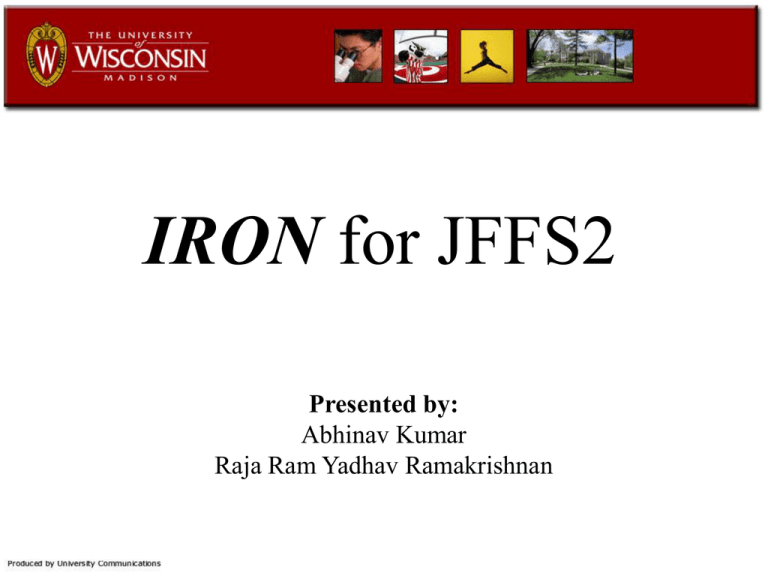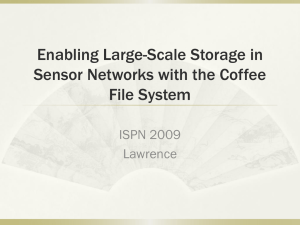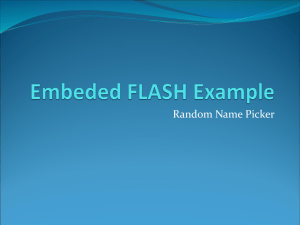ppt
advertisement

IRON for JFFS2
Presented by:
Abhinav Kumar
Raja Ram Yadhav Ramakrishnan
Motivation:
• Flash Storage is being increasingly used in the internal memory of
Smart Phones
• Among the current flash file systems the foll two are dominant:
1. JFFS (Journaling Flash File system)
2. YAFFS(Yet Another Flash File system)
• IRON-like analysis has not been on Flash File Systems
Why an IRON-like analysis ?:
• Tests performed without modifying file system code
• Same pseudo-driver can be used to study other Flash File systems
too
NAND Storage Basics:
• Memory is arranged as an array of pages
• A page consists of 256 / 512 Byte data and 8 / 16 Byte spare (out
of band) area
• The spare area is used to store ECC (error correction code), bad
block information and filesystem-dependent data
• Wear leveling is needed
Some Flash File system Basics:
• Flash doesn't match the description of either block or char devices
• Differences between flash and block devices
• A special device called “MTD” was created
Flash File system Basics continued…
• USB Flash Drives, SD Cards also treated as Block Devices
• File Translation Layer(FTL) needed to use traditional File Systems
like ext2 on MTD devices
• Why we shouldn’t use FTL…..
Flash Storage Stack:
About JFFS2:
• Log Structured File System to enable write leveling
• On-the-fly compression and decompression
• Uses Cleanmarkers to indicate whether a block was successfully
erased
0x08
0x09
0x0a
0x0b
0x0c
0x0d
0x0e
0x0f
0x85
0x19
0x03
0x20
0x08
0x00
0x00
0x00
High-level implementation details:
• NAND simulator (nandsim)
• Provided us with a useful interface to simulate faults
• Used the interfaces to conduct several “IRON” like tests
Tests Performed:
• Read Failure of entire block
JFFS2
• Read Failure (single bit)
• Read Failure (multiple bits)
• Write Failure
• Erase Failure
• Write Failure during GC
Pseudo-Driver
• Progress table
Test
Performed
Error
Detected?
Recovered
from Error?
Comments
• Read Failure (entire page)
JFFS2
Read
Pseudo-Driver
Propagate an error
code
• Kernel Error Message Observed:
JFFS2 error: (10411) jffs2_get_inode_nodes: can not read 512 bytes
from 0x01ff8200, error code: -1.
JFFS2 error: (10411) jffs2_do_read_inode_internal: cannot read
nodes for ino 2, returned error is -1
Returned error for crccheck of ino #2. Expect badness...
• Progress table
Test
Performed
Read Failure
(entire page)
Error
Recovered
Detected from
?
Error?
Comments
Error Propagation but no retry
• Read Failure (single bit)
JFFS2
Read
Pseudo-Driver
• Observation
Successful detection and correction
Flipped one bit
just before
reading
• Progress table
Test
Performed
Error
Recovered
Detected from
?
Error?
Comments
Read Failure
(entire page)
Error Propagation but no retry
Read Failure
(single bit)
Error was detected and also
corrected using checksum
• Read Failure (multiple bits)
JFFS2
Read
Pseudo-Driver
Flipped more than
a bit
• Kernel Error Message Observed:
JFFS2 notice: (8889) read_dnode: wrong data CRC in data node at
0x01ff8200: read 0x1aaee62e, calculated 0x6cae3da6.
• Progress table
Test
Performed
Error
Recovered
Detected? from
Error?
Comments
Read Failure
(entire page)
Error Propagation but no retry
Read Failure
(single bit)
Error was detected and also
corrected using checksum
Read Failure
(multiple bits)
Error detection
No error correction
No error propagation
No retry
Why?:
static inline int read_dnode(struct jffs2_sb_info *c, struct jffs2_raw_node_ref
*ref,
struct jffs2_raw_inode *rd, int rdlen,
struct jffs2_readinode_info *rii)
{
int ret = 0;
********
********
if (len >= csize && unlikely(tn->partial_crc != je32_to_cpu(rd>data_crc)))
{
JFFS2_NOTICE("wrong data CRC in data node at 0x%08x: read %#08x,
calculated %#08x.\n",ref_offset(ref), tn->partial_crc,
je32_to_cpu(rd->data_crc));
jffs2_mark_node_obsolete(c, ref);
goto free_out;
}
**********
**********
free_out:
jffs2_free_tmp_dnode_info(tn);
return ret;
}
• Write Failure
JFFS2
Write
Returned an Error
Pseudo-Driver
• Observation:
Infinte retry leading to kernel crash
• Progress table
Test
Performed
Error
Recovered
Detected? from
Error?
Comments
Read Failure
(entire page)
Error Propagation but no retry
Read Failure
(single bit)
Error was detected and also
corrected using checksum
Read Failure
(multiple bits)
Error detection
No error correction
No error propagation
No retry
Write Failure
Error Propagation and infinite
retry
Why?:
int jffs2_flush_wbuf_gc(struct jffs2_sb_info *c, uint32_t ino)
{
******
while (old_wbuf_len && old_wbuf_ofs == c->wbuf_ofs)
{
mutex_unlock(&c->alloc_sem);
D1(printk(KERN_DEBUG "jffs2_flush_wbuf_gc() calls gc pass\n"));
ret = jffs2_garbage_collect_pass(c);
if (ret) {
/* GC failed. Flush it with padding instead */
mutex_lock(&c->alloc_sem);
down_write(&c->wbuf_sem);
ret = __jffs2_flush_wbuf(c, PAD_ACCOUNTING);
/* retry flushing wbuf in case jffs2_wbuf_recover
left some data in the wbuf */
if (ret)
ret = __jffs2_flush_wbuf(c, PAD_ACCOUNTING);
up_write(&c->wbuf_sem);
break;
}
*****
• Progress table in GC path
Test
Performed
Error
Detected?
Recovered
from Error?
Comments
• Erase Failure
JFFS2
Erase
Returned an Error
Pseudo-Driver
• Kernel Error Message Observed:
Erase at 0x01ffc000 failed immediately: errno -1
No space left on device
• Progress table in GC path
Test
Performed
Erase Failure
Error
Detected?
Recovered
from Error?
Comments
Error propagation
but no retry
• Write Failure in GC path:
Write
during
GC
JFFS2
Returned an Error
Pseudo-Driver
• Observation:
Infinite retry observed because of the same reason
• Progress table in GC path
Test
Performed
Error
Detected?
Recovered
from Error?
Comments
Erase Failure
Error propagation
but no retry
Write Failure
Infinite retry with
kernel crash
Test
Performed
Error
Recovered
Detected? from
Error?
Comments
Read Failure
(entire page)
Error Propagation but no retry
Read Failure
(single bit)
Error was detected and also
corrected using checksum
Read Failure
(multiple bits)
Error detection
No error correction
No error propagation
No retry
Write Failure
Error Propagation and infinite
retry
Erase Failure
Error Propagation but no retry
Write Failure in
GC path
Infinite retry with kernel crash
Conclusion:
• Several tests were performed on JFFS2
• It has many favorable characteristics:
1. On-the-Fly Compression and Decompression
2. Checksumming
3. Good Recovery techniques like Error propagation, retry on most
cases
• However the recovery technique isnt apt in some cases like Read
Failure(multiple bits), Write failure
Future Work:
• Further exploration of the GC path
• Failure of specific metadata blocks such as i-node, i-node map etc
References:
• JFFS : The Journalling Flash File System
By David Woodhouse, Red Hat Inc.
• IRON File Systems
By Vijayan Prabhakaran, Nitin Agrawal, Lakshmi Bairavasundaram,
Gunawi, Andrea C. Arpaci-Dusseau and Remzi H. Arpaci-Dusseau
• Essential Linux Device Drivers
by Sreekrishnan Venkateswaran
• Linux Device Drivers, Third Edition
Jonathan Corbet, Alessandro Rubini,Greg Kroah-Hartman
Haryadi
Acknowledgements:
• Special thanks to Prof. Remzi Arpaci-Dusseau for giving us a chance to work on
this project
Questions?







